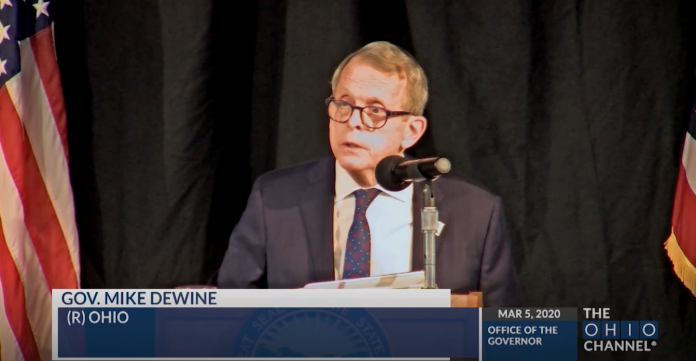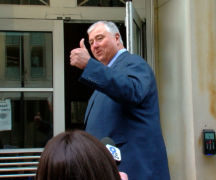Ohio Gov. Mike Dewine on Thursday reversed a position he’d taken a day earlier. He said that although he still supported a ratepayer bailout of two Northern Ohio nuclear plants, the state legislature should “repeal and replace” an existing law that federal prosecutors say is the product of a criminal conspiracy.
But although DeWine said “The process by which this bill was passed is simply not acceptable,” the governor refused to criticize the actions of a senior aide who ran a dark-money group that contributed $5 million to the effort to pass the bailout.
Such groups have been at the heart of several state political scandals in recent years — including Ohio’s present difficulties.
Federal officials on Tuesday arrested Ohio House Speaker Larry Householder, one of his top aides and three prominent Ohio lobbyists on charges that they participated in a corrupt scheme to rig several elections and pass House Bill 6, a $1.3 billion bailout of two failing nuclear plants, a coal-fired plant in Ohio and another in Indiana.
The 81-page criminal complaint said that Akron-based FirstEnergy and related interests funneled $61 million into 501(c)(4) dark money groups. The funds were used to, among other things, finance House elections to help elect Householder speaker, fight a ballot initiative aimed at repealing the measure, and finance a xenophobic TV and mail campaign, the complaint said.
The bailout FirstEnergy extracted from ratepayers was in addition to $10.2 billion in subsidies the company has received since 1999.
The scheme was “likely the largest bribery and money-laundering scheme ever in the state of Ohio,” said David M. DeVillers, U.S. Attorney for the Southern District of Ohio.
Despite that — and despite the fact that FBI Special Agent in Charge Chris Hoffman said that the investigation was only at “the end of the beginning” — DeWine on Wednesday said Householder should resign, but HB 6 shouldn’t be overturned because it remained “good policy.”
Last year, when DeWine signed the bill, the news organization Vox called it “the worst energy bill of the 21st century.”
On Thursday, DeWine said that while he remained convinced that HB 6 was good policy, but he had decided that the process under which the nuclear bailout was passed “undermines the public trust.” Therefore, he was calling on the Ohio General Assembly to repeal it and then pass something similar.
A bipartisan group of lawmakers had already proposed a repeal, but at least some of them are not interested in passing another version of the bailout.
On Wednesday, as DeWine refused to question the wisdom of bailing out nuclear plants that can’t compete with electricity generated by natural gas or from renewable sources, he also refused to question the propriety of an aide’s participation in a dark-money group that worked to pass HB 6.
The Cincinnati Enquirer on Thursday reported that before he became DeWine’s legislative director, Dan McCarthy was a lobbyist for FirstEnergy. McCarthy also was president of Partners for Progress Inc., a 501(c)(4) dark money group that passed millions of dollars into Householder’s dark money group, Energy Now.
Energy Now was charged along with Householder on Tuesday, while Partners for Progress was not. In addition, DeVillers, the U.S. attorney, said he’d seen no evidence that the DeWine administration had participated in the corrupt scheme to pass HB 6.
However, DeVillers said “I don’t see how (the conspiracy) could possibly have happened” if not for the abuse of 501(c)(4)s in funding it.
They’re called “dark money” groups because they don’t have to disclose their contributors.
IRS rules say such organizations “must be operated exclusively to promote social welfare.” The rules add that the groups “may engage in some political activities, so long as that is not its primary activity.”
But the IRS has been notoriously lax in enforcing these rules and it doesn’t appear that the millions that passed by McCarthy’s dark money group to Householder’s were used for anything other than political purposes.
In a statement to the Enquirer, McCarthy said he was unaware of the corrupt scheme and that he opposed Householder’s bid for speaker.
On Thursday, DeWine said McCarthy “is someone who has done an excellent job for the people of the state of Ohio.” He later added “Dan McCarthy is someone with a great deal of integrity. There’s no evidence that Dan McCarthy did anything illegal or anything wrong.”
Dark money groups have been engines for massive scandals in other states involving ugly campaigns similar to that for HB 6.
In 2012, payday lenders funneled money into 501(c)(4)s to help elect an attorney general candidate in Utah who was accused of planning to use his office to help the industry. At the same time, the companies used the secrecy the dark money groups afforded them to viciously and spuriously attack Utah lawmakers who wanted to impose greater regulations on the industry.
The scandal resulted in criminal indictments and a big shakeup in Utah state politics.
In 2010, when the U.S. Supreme Court issued its decision in Citizens United v Federal Election Commission, it wasn’t supposed to be this way.
In explaining their controversial decision to allow unlimited corporate political expenditures, a majority of justices stressed that disclosure of the sources of the money was key. They wrote that such “transparency enables the electorate to make informed decisions and give proper weight to different speakers and messages.”
When dark money groups such as Householder’s engage mostly or exclusively in political activity, that principle is thwarted.
Also, corporate political expenditures aren’t supposed to be coordinated with political campaigns — something that happened repeatedly in the HB 6 scheme, the complaint against Householder said.
“Citizens United didn’t say campaign finance is the wild west,” said Catherine Turcer, executive director of Common Cause Ohio, which advocates for government accountability. “It said that corporations have the right to pay for political advertisements that are not coordinated with candidates and that disclosure was constitutional. So… we have to do something about the coordination rules and we have to do something about the disclosure rules.”
For his part, DeWine seemed to say that since many corporations are using dark money groups with the primary purpose of influencing the political process, it’s OK.
“Organizations like the one Dan (McCarthy) had connection with are very common; they’re out there all the time and they’re perfectly legal,” DeWine said. “There’s nothing wrong with them.”
But asked if he would follow the lead of at least four other states by requiring that contributors to dark money groups be disclosed, he said, “I am for as much disclosure as United States Supreme Court decisions allow.”
Tercer said the Buckeye State is sorely in need for such disclosure.
“We have not done in Ohio what we need to do to shine a light on secret money so that we have this elaborate scheme to move legislation and to strongarm legislators into voting for it,” she said.
***
Speaker Householder is ‘absent.’ What now?
As the Ohio legislature talks about repealing a law that is now the center of a federal investigation, they are facing a major problem: How does the House come back without a speaker?
Those within House leadership are looking for policy that specifically deals with the situation, and the rules seem to be slightly vague.
“We’re all still trying to figure out procedure, getting everyone back and doing all of those things, but it’s something we’re definitely talking about,” said Assistant Majority Whip, state Rep. Laura Lanese, during a Thursday press conference on plans to repeal House Bill 6, the nuclear bailout bill under federal scrutiny.
She and fellow Republican Rep. Rick Carfagna, R-Genoa Twp., are among a bipartisan list of elected officials who have asked for Speaker Larry Householder, R-Glenford, to resign after announcement of a federal investigation into alleged bribery and money laundering related to the bill. READ MORE





